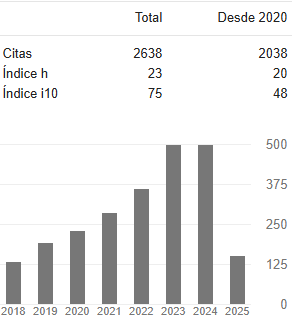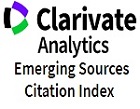Makespan optimization in the fl exible Job Shop problem with transportation constraints using Genetic Algorithms
DOI:
https://doi.org/10.31908/19098367.3820Keywords:
Job Shop, Flexible Job Shop, Flexible Job Shop with transportation constraints, Transportation constraints, Genetic Algorithm, GA, Metaheuristics, MakespanAbstract
We solved the Flexible Job Shop Scheduling Problem (FJSSP) with transportation constraints in order to minimize the makespan by sequencing and assigning machines. A bibliographic review was made in order to guide the methodology to be used. From there, we approached the problem with a genetic algorithm. We validated its eff ectiveness by comparing the results obtained with diff erent instances proposed in the literature. The results obtained show that the proposed genetic algorithm is efficient in the diff erent classic Job Shop confi gurations tested. The algorithm is able to find very approximate solutions to the best found to date for the Flexible Job Shop Scheduling Problem with transportation constraints.
Downloads
References
hang, G., Shao, X., Li, P. and Gao, L., “An effective hybrid particle swarm optimization algorithm for multi-objective flexible job-shop scheduling problem”, Computers & Industrial Engineering, vol. 56, no. 4, pp. 1309-1318, 2009. doi: 10.1016/j.cie.2008.07.021
Tang, J., Zhang, G., Lin, B. and Zhang, B., “A hybrid algorithm for flexible job-shop scheduling problem”, Procedia Engineering, vol. 15, pp. 3678-3683, 2011. doi: 10.1016/j.proeng.2011.08.689
Fernández, M. A., “Soluciones metaheurísticas al ‘Job-shop scheduling problem with sequence-dependent setup times’”, Ph.D. dissertation, directed by M. del C. Rodríguez Vela, Universidad de Oviedo, España, Jul. 2011
Rossi, A., “Flexible job shop scheduling with sequence-dependent setup and transportation times by ant colony with reinforced pheromone relationships”, International Journal of Production Economics, vol. 153, pp. 253-267, 2014. doi: 0.1016/j.ijpe.2014.03.006
Garey, M. R. y D. S. Johnson, Computers and intractability: a guide to the theory of NP-completeness, San Francisco, LA: Freeman, 1979.
John Henry Holland, Adaptation in natural and artificial systems: an introductory analysis with applications to biology, control, and artificial intelligence, Cambridge, MA: MIT press, 1992.
Jain, A. S. and S. Meeran, “Deterministic job-shop scheduling: Past, present and future”, European journal of operational research, vol. 113, no. 2, pp. 390-434, 1999. doi: 10.1016/S0377-2217(98)00113-1
Graham, R. L., Lawler, E. L., Lenstra, J. K. and Kan, A. R., “Optimization and approximation in deterministic sequencing and scheduling: a survey”, Annals of discrete mathematics, vol. 5, pp. 287-326, 1979. doi: 10.1016/S0167-5060(08)70356-X
Conway, R. W., Maxwell, W. L. and Miller, L. W., Theory of scheduling. Courier Corporation, 2012.
Johnson, S. M., “Optimal two and three stage production schedules with setup times included”, Naval research logistics quarterly, vol. 1, no. 1, pp. 61-68, 1954. doi: 10.1002/nav.3800010110
Najid, N. M., Dauzere-Pérès, S. y Zaidat, A., “A modified simulated annealing method for flexible job shop scheduling problem”, IEEE International Conference on Systems, Man and Cybernetics, vol. 5, p. 6, 2002. doi: 10.1109/ICSMC.2002.1176334
Brucker, P. and Schlie, R., “Job-shop scheduling with multi-purpose machines”, Computing, vol. 45, no. 4, pp. 369-375, 1990.
Jansen, k., Mastrolilli, M. and Solis-Oba, R., “Approximation algorithms for flexible job shop problems” In: LATIN 2000: Theoretical Informatics. Springer Berlin Heidelberg, pp. 68-77, 2000.
A. P. Jiménez, C. A. Muñoz and E. M. Toro. “Solución del Problema de Flow Shop Flexible Aplicando el Algoritmo Genético de Chu- Beasley”, Entre Ciencia e Ingeniería, vol. 7, no. 13, pp. 34-40, 2013.
Xia, W. and Wu, Z., “An effective hybrid optimization approach for multi-objective flexible job-shop scheduling problems”, Computers & Industrial Engineering, vol. 48, no. 2, pp. 409-425, 2005. doi: 10.1016/j.cie.2005.01.018
Osorio, J. C., Motoa, T. G., “Planificación jerárquica de la producción en un job shop flexible”, Revista Facultad de Ingeniería Universidad de Antioquia, no. 44, pp. 158-171, 2008.
Gao, J., Gen, M. and Sun, L., “Scheduling jobs and maintenances in flexible job shop with a hybrid genetic algorithm”, Journal of Intelligent Manufacturing, vol. 17, no. 4, pp. 493-507, 2006. doi: 10.1007/s10845-005-0021-x
Zhang, G., Shao, X., Li, P. and Gao, L., “An effective hybrid particle swarm optimization algorithm for multi-objective flexible job-shop scheduling problem”, Computers & Industrial Engineering, vol. 56, no. 4, pp. 1309-1318, 2009. doi: 10.1016/j.cie.2008.07.021
De Giovanni, L. and Pezzella, F., “An improved genetic algorithm for the distributed and flexible job-shop scheduling problem”, European journal of operational research, vol. 200, no. 2, pp. 395-408, 2010. doi: 10.1016/j.ejor.2009.01.008
Zhang, Q., Manier, H. and Manier, M. A., “A genetic algorithm with Tabu Search procedure for flexible Job Shop Scheduling with transportation constraints and bounded processing times”, Computers & Operations Research, vol. 39, no. 7, pp. 1713-1723, 2012. doi: 10.1016/j.cor.2011.10.007
Moslehi, G. and Mahnam, M., “A Pareto approach to multi-objective flexible Job-Shop Scheduling problem using Particle Swarm Optimization and local search”, International Journal of Production Economics, vol. 129, no. 1, pp. 14-22, 2011. doi: 10.1016/j.ijpe.2010.08.004
González, M. A., Rodríguez Vela, C. and Varela, R., “An efficient memetic algorithm for the flexible job shop with setup times”, In: Twenty-Third International Conference on Automated Planning and Scheduling, Febrero, 2013.
Liu, Z., Ma, S., Shi, Y. and Teng, H., “Solving multi-objective Flexible Job Shop Scheduling with transportation constraints using a micro artificial bee colony algorithm”, In: Computer Supported Cooperative Work in Design (CSCWD), 2013 IEEE 17th International Conference on, IEEE, pp. 427-432, Junio, 2013. doi: 10.1109/CSCWD.2013.6581001
Rossi, A., “Flexible job shop scheduling with sequence-dependent setup and transportation times by ant colony with reinforced pheromone relationships” International Journal of Production Economics, vol. 153, pp. 253-267, 2014. doi: 10.1016/j.ijpe.2014.03.006
Gallego, G., “Linear control policies for scheduling a single facility after an initial disruption”, Informe técnico No. 770, School of Operations Research and Industrial Engineering, Cornell University, Ithaca, NY, enero, 1988.
DE JONG, K. A., “An analysis of the behaviour of a class of genetic adaptive systems”. Tesis doctoral, Universidad de Michigan, Ann Arbor, MI, USA, 1975.
Fisher, H. and Thompson, G. L., “Probabilistic learning combinations of local job-shop scheduling rules”, Industrial scheduling, vol. 3, pp. 225-251, 1963.
Lawrence, S., “Resource constrained project scheduling: an experimental investigation of heuristic scheduling techniques (supplement)”. Tesis doctoral, Carnegie-Mellon University, Graduate School of Industrial Administration, Pittsburgh, PA, 1984.
Fattahi, P., Mehrabad, M. Saidi, J. y Fariborz., “Mathematical modeling and heuristic approaches to flexible job shop scheduling problems”, Journal of Intelligent Manufacturing, vol. 18, no 3, pp. 331-342, 2007. doi: 10.1007/s10845-007-0026-8
Dauzère-Pérès, S. and Paulli, J., “An integrated approach for modeling and solving the general multiprocessor job-shop scheduling problem using tabu search”, Annals of Operations Research, vol. 70, p. 281-306, 1997. doi: 10.1023/A:1018930406487
Hurink, J. and Knust, S., “Makespan minimization for flow-shop problems with transportation times and a single robot”, Discrete Applied Mathematics, vol. 112, no 1, pp. 199-216, 2001. doi: 10.1016/S0166-218X(00)00316-4
Deroussi, L. and Norre, S., Simultaneous scheduling of machines and vehicles for the flexible job shop problem. En: International conference on metaheuristics and nature inspired computing. 2010.
Zhang, Q., Manier, H. and Manier, M.-A., “A genetic algorithm with Tabu Search procedure for flexible job shop scheduling with transportation constraints and bounded processing times”, Computers & Operations Research, vol. 39, no 7, p. 1713-1723, 2012. doi: 10.1016/j.cor.2011.10.007
Box, G. E. P., Stuart Hunter, J. and Hunter, W. G., Statistics for Experimenters: Design, Innovation, and Discovery. Wiley-Interscience: New York, NY, USA, vol. 2, 2005.
Castrillón, O. D., Giraldo J. A. y Sarache, W. A., “Solución de un problema Job Shop con un agente inteligente”, Ingeniería y Ciencia, vol. 5, no. 10, pp. 75–92, 2009.
Downloads
Published
Issue
Section
License
Copyright (c) 2019 Entre ciencia e ingeniería

This work is licensed under a Creative Commons Attribution-NonCommercial 4.0 International License.



















